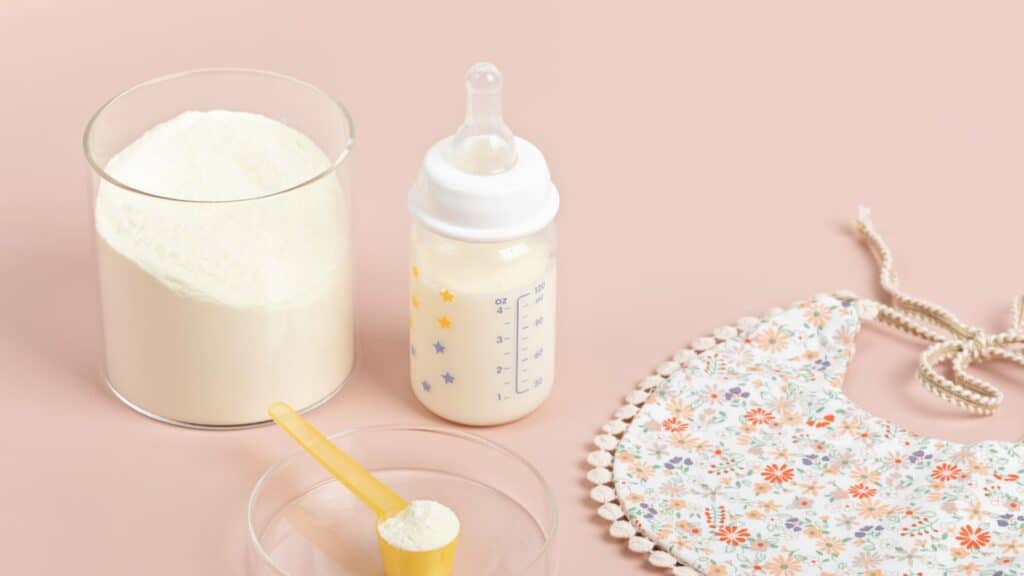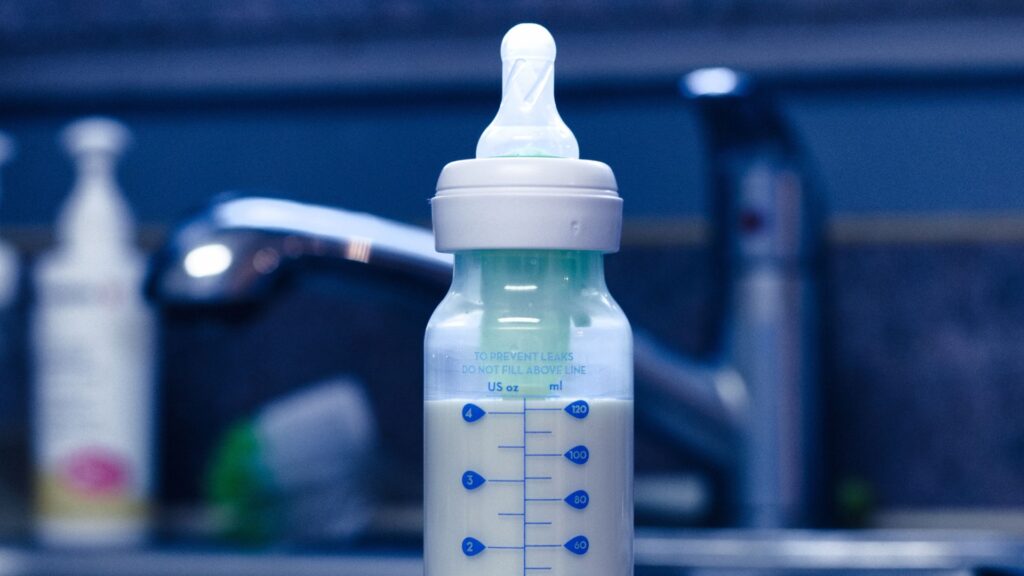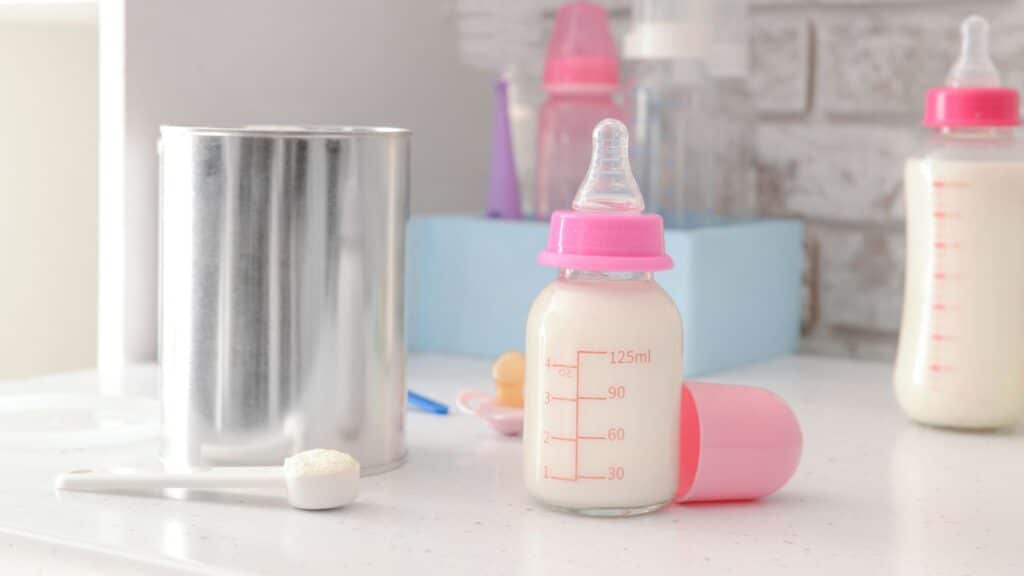Have you ever considered using a premixed baby formula for your little one? Or maybe you’re a caregiver looking for a convenient, reliable feeding option for a child in your care. In either case, a pre-mixed baby formula might just be the solution you’re looking for.
In this blog post, we’ll explore the benefits of pre-mixed baby formula including its convenience, nutritional value and ease of use. We’ll also address common concerns and misconceptions about formula feeding and provide tips for selecting the right formula for your baby’s needs.
So whether you’re a first-time parent or an experienced caregiver keep reading to learn more about the benefits of pre-mixed baby formula.

What is Pre-Mixed Baby Formula?
Pre-mixed baby formula is a type of powdered formula that’s made up of the right combination of nutrients, vitamins, and minerals to meet your baby’s needs. It’s ready to use right out of the box and doesn’t require any mixing with water or other liquids.
Pre-mixed baby formula is typically sold in plastic bottles, which are designed for easy pouring and storage. The bottles are also labeled with information about the product, including ingredients and instructions on how to use it safely.
There are many advantages to using premixed baby formula instead of mixing your own from scratch:
It Saves Time:
You don’t have to spend hours preparing bottles before you leave the house or go back to work after maternity leave ends.
It’s Convenient:
You don’t have to worry about running out of ingredients or forgetting something at home when you’re out and about.
It Eliminates Waste:
You can avoid throwing away leftover milk or juice that doesn’t get used up before spoilage occurs.
It’s important to note that while pre-mixed baby formula can be a convenient option for parents, it may not always be the best choice for every baby. Formula-fed babies may have different needs and preferences when it comes to their diet, and there are various types of infant formulas available on the market, including powdered, concentrated liquid formula, and ready-to-feed formula.
It’s also worth noting that the World Health Organization recommends exclusive breastfeeding for the first six months of a baby’s life, as breast milk provides optimal nutrition and protection against infections and diseases. Formula feeding can be a suitable alternative when breastfeeding is not possible, but it’s important to follow proper infant formula preparation and feeding guidelines from organizations such as the Food and Drug Administration and infant formula manufacturers to ensure your baby’s safety and well-being.
Additionally, studies have linked formula feeding (especially if it is not prepared or stored properly) to an increased risk of Sudden Infant Death Syndrome (SIDS). Therefore, it’s essential to follow safe feeding practices, such as avoiding overfeeding and using appropriate baby bottles, to reduce the risk of SIDS and other health concerns.
The Convenience of Pre-Mixed Formula
The convenience of pre-mixed formulas is hard to beat. It’s no wonder that parents are increasingly choosing this option for their children.
Pre-mixed baby formula is ready for use right out of the box, so you don’t have to measure water or mix it with powdered formula. It’s also fast. You simply open the bottle and pour it into a bottle, and your baby is good to go!
This can save you time and hassle in the morning when you’re trying to get yourself and your kids ready for work or school. There’s no need to worry about having the right amount of water or dry powder on hand or having to clean up after mixing just squeeze some pre-mixed formula into the bottle and go!
However, it’s important to note that pre-mixed formula can be more expensive than powdered infant formula or concentrated formula. Additionally, while pre-mixed formula can be convenient, it may not always be available in all stores or in the specific brand that your baby prefers.

Therefore, some parents may choose to use powdered or concentrated infant formula instead.
It’s also worth mentioning that while formula can be a safe and nutritious option for infants who cannot be breastfed, breast milk is still the best source of nutrition for babies. Breast milk provides a unique blend of nutrients and antibodies that can help protect babies from illnesses and promote healthy growth and development.
It’s recommended that infants be exclusively breastfed for the first six months of life, with continued breastfeeding alongside the introduction of solid foods until at least one year of age.
Consistency and Safety of Pre-Mixed Formula
The consistency and safety advantages of the pre-mixed formula are a boon for parents and caregivers.
With pre-mixed formula, you know exactly how much formula you’re giving your baby, so it’s easy to make sure you’re giving them the right amount at every feeding.
You also don’t have to worry about bacteria or other contaminants in the formula, because it’s all pasteurized before it’s packaged.
It can be a great option for parents who:
- Want to avoid the hassle of mixing formulas from powder.
- Don’t want to worry about using too much or too little formula, or accidentally adding bacteria or contaminants to their baby’s bottle.
- Want to make sure their baby has the correct amount of formula in each bottle, which is important for proper nutrition.
As you can see, there are many reasons why parents choose to use pre-mixed formulas over the traditional method of mixing their own.
Reducing the Risk of Infection with Pre-Mixed Formula
When your baby is born, you want to do everything in your power to give them the best possible start in life. That’s why it’s so important to make sure that the formula you’re using for them is not only nutritious and delicious, but safe too!
The American Academy of Pediatrics recommends that breastfeeding be the first choice for infants, but not all parents are able to breastfeed. For those who can’t breastfeed, it’s important to find a formula that has the least chance of causing infections.
That’s where the pre-mixed formula comes in. Pre-mixed formulas are available for babies who are premature or have weakened immune systems, helping to reduce the risk of bacterial infections. The ingredients are blended together in a way that allows them to be easily digested without having to be cooked or prepared separately.
A recent study has found that pre-mixed infant formulas have a lower risk of bacterial infection than powder formulas, especially in premature babies and those with weakened immune systems. The study looked at over 6,000 infants who had been hospitalized before they were six months old and compared their rates of bacterial infection with their formula type: powdered vs. pre-mixed. The results showed that pre-mixed formulas had a lower rate of infection than powdered ones about one-third less likely for premature infants and two-thirds less likely for babies with weakened immune systems.
Although this study didn’t examine why pre-mixed formulas might be better at reducing bacterial infections than powder ones, researchers think it may have something to do with the way they’re manufactured. Pre-mixed formulas are heated twice: once before they’re packaged as a dry powder and then again when they’re mixed with water to make them ready for feeding time. This heating process kills any bacteria that might be present in

Cost Considerations of Pre-Mixed Formula
When considering pre-mixed formula, you’ll want to consider the cost per ounce or per serving. This is important because it helps you determine which type of formula is the most affordable for your family.
Most pre-mixed formulas are relatively inexpensive compared to other types of formulas.
However, if you’re looking for something even more cost-effective, consider making your own formula from powder or liquid concentrate. You can do this at home with minimal equipment, and it will save you even more money than buying pre-mixed formulas.
When comparing the cost of pre-mixed formula to other types of formula, it’s important to take into account the specific needs of your baby. For example, if your baby requires a ready-to-feed formula, this may be more expensive than a formula that requires mixing with water.
Additionally, if your baby has a sensitivity or allergy to cow’s milk, you may need to purchase a specialized formula, which could also affect the cost.
Breastfed babies may not require formula at all, but if you do decide to supplement with formula, it’s important to speak with a healthcare professional to determine the best option for your baby’s needs.
Ultimately, when it comes to feeding your infant, it’s important to consider not only the cost but also the nutritional value and safety of the baby’s formula. Always follow the recommended guidelines for preparing and storing infant formula to ensure your baby’s health and well-being.
Variety and Availability of Pre-Mixed Formula
One of the great things about pre-mixed formulas is that there are so many options. You can choose from a range of brands, formulas for different stages of development, and specialty formulas for babies with specific health needs.
There are many brands to choose from, and each one has its own unique formula and flavor. Some brands have more than one option available for you to choose from, so you can get exactly what you want for your baby.
If you’re looking for something that’s even easier than mixing your own, there are also some premixed formula options available! These are great for busy parents who don’t want to spend time mixing up bottles every day.
The ready-to-feed formula is a type of premixed formula that is available for parents who want the convenience of not having to mix their own formula. This type of formula is ready to use straight out of the bottle and can be a great option for parents who are on the go or don’t have the time or resources to mix their own formula.
It’s important to note that ready-to-feed formula is usually more expensive than other types of formula, such as powdered or liquid concentrate formula. However, it can be a good option for parents who want the convenience of not having to mix their own formula and for babies who are sensitive to cow’s milk or who have specific health needs that require a specialized formula.
For babies who are fed infant formula, whether it’s a ready-to-feed formula, powdered formula, or liquid concentrate formula, it’s important to follow the instructions on the packaging carefully to ensure that your baby is getting the appropriate amount of nutrients.
Breastfed babies may not need formula at all, but if you do decide to supplement with formula, it’s important to talk to your doctor or a lactation consultant to ensure that you are doing so safely and appropriately.
When Pre-Mixed Formula May Not Be the Best Choice
Not all parents are going to be comfortable with pre-mixed formulas. If you have concerns about additives or flavorings, or if you’re concerned about waste if the baby doesn’t finish a bottle, then it may not be the best choice for you.
Babies are very sensitive to flavors and smells of food, so it’s important to note that many of these pre-mixed formulas contain artificial flavors and colors as well as other additives. While many babies will have no problem with these ingredients, there are others who may have digestive issues or allergies to them. It’s important to check with your doctor before making a decision about whether this is the right choice for your baby.
Another thing to consider is how much waste will be created by using a pre-mixed formula. Some bottles come with nipples that can be reused multiple times, but most do not. This means that after each feeding, there is a new nipple that needs to be thrown away and those things add up fast!
You should also take into account how much money it will cost overall when considering any type of ready-to-use formula versus making your own at home using dry powder or concentrate instead.

Conclusion
In conclusion, choosing the right baby formula for your family is an important decision that will have a lasting impact on your child’s health and development, as well as your own. Although there are many different formulas available, each of them has its own unique set of benefits and drawbacks. Ultimately, it’s up to you to decide which one is best for your family.
It’s important to keep in mind that every family has unique needs and preferences when it comes to feeding their baby. Some families may prefer organic formulas made with robust ingredients like whole milk and whey protein isolate; others may prefer more natural options like soy-based formulas; while others still may prefer organic formulas made with robust ingredients like whole milk and whey protein isolate.
The goal is to choose the baby formula that works best for your baby’s health and development, as well as your lifestyle and budget.
We’d love to hear from you! Have a question? Let us know in the comments.



